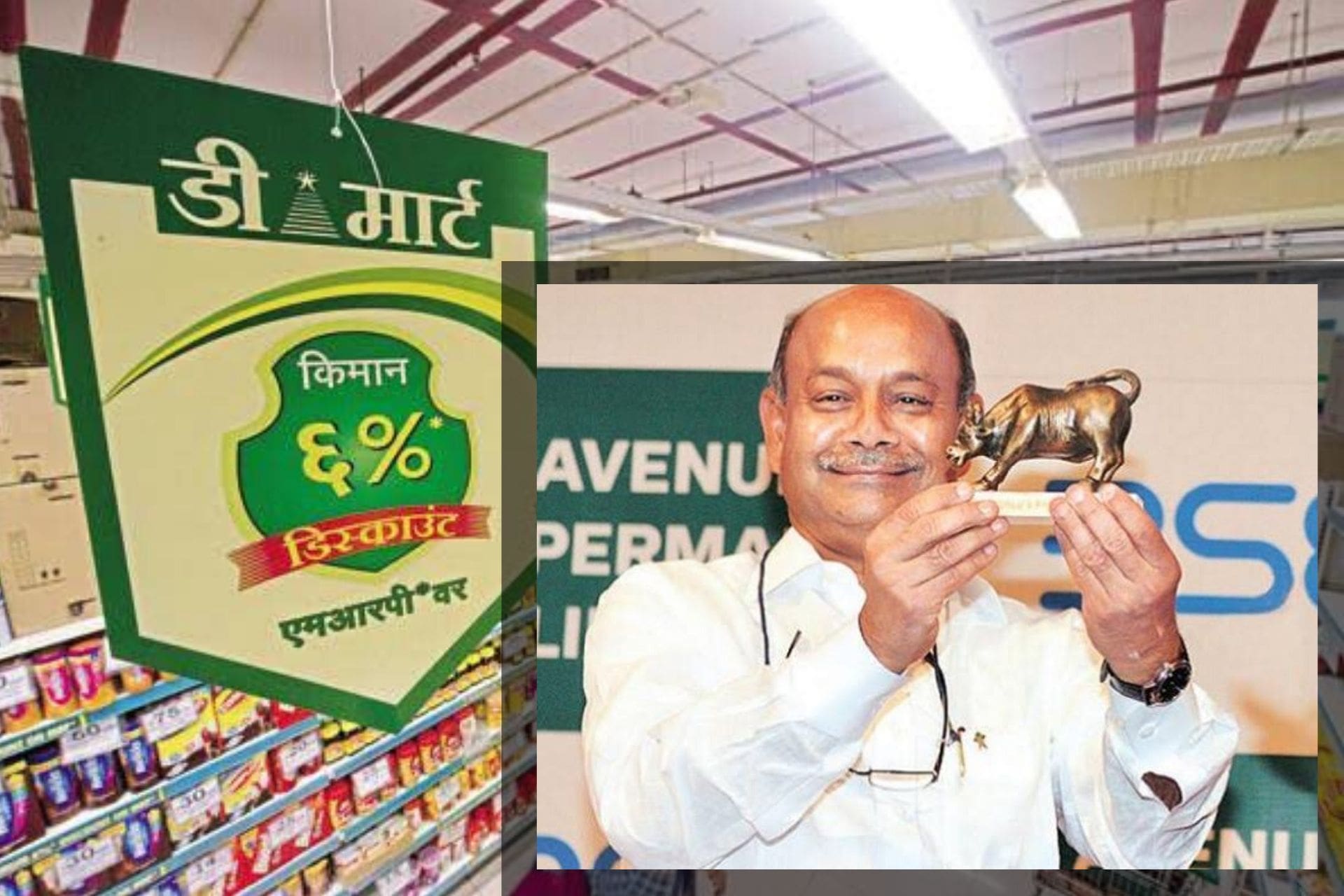D’Mart Stores is a gaint retail stores in India owned by billionaire investor and business man RK Damani. In today’s article of Market Forensics by Trade Brains, we’ll be discussing the success journey of D’Mart Stores and what’s ahead in their path. Let’s get started.
Table of Contents
D’Mart Stores Foundation
D’Mart is an acronym for DAMANI Mart. It is the biggest hypermarket retail outlet chain. D’Mart is owned by none other but, Radhakrishna Damani, the ace investor in the Indian Stock Market and one of the stock market wizards of the ’90s. The current stock market bull, Rakesh Jhunjhunwala, considers him to be his mentor and tutor.
D’Mart was established in the year 2002 on May 15. Today, D’Mart has more than 210 stores in 72 cities and across 11 states in India including states like Maharashtra, Andhra Pradesh, Gujrat, Madhya Pradesh, Rajasthan, Tamil Nadu, etc. D’Mart is managed and operated under the registered name of Avenue Supermart Limited (ASL). Avenue Supermart was listed on the National stock exchange on 21st March 2017.

Avenue Supermart Valuation Timeline
As mentioned above, Avenue supermart went public and got registered on Indian stock exchanges in March 2017. Here are a few important Avenue Supermart Valuation timelines:
- On the day of the listing, the company had tremendous listing gains. And the close of the market on 22nd March 2017, D’Mart’s valuation rose to its all-time high of Rs. 39988 crores. And this made D’Mart the 65th most valuable firm in India in terms of Market Capitalisation.
- And on 21st November 2019, the market capitalization of D’Mart stood at Rs. 1,14,000 cores. And it makes it the 33rd most valued organization in India.
- And on 11th November 2020, the market capitalization of D’Mart stands at Rs. 1,55,275 Crores.
D’Mart Stores vs Other Retail Marts
The next big question is what differentiated D’Mart from other players in the Retail segment?
Damani founded the grocery chain store D’mart in the most unique way and employed an unheard technique in the Indian retail set up. Till date, all the major retailers would rent the premises for their operations. But, D’mart would buy the premise which they would want to use for their retailing operations. This technique of Buying (and not renting) has worked do far and they did not yet have to close any of their setups.
Another interesting difference between D’mart and other retail business players is that other players build and promote their in-house brands to boost margin and provide alternatives to consumers. But, D’mart only sells the outside brands in its outlets.
The modesty and quiet nature are the most important quality of Radhakrishna Damani. For an individual with a net worth of nearly $ 16 billion, he still wears his white shirt white jeans to work, the style which he has been carrying from the 80’s.
D’Mart Stores Structure
As mentioned earlier, D’Mart run stores are company-owned, so they don’t have to bother about paying rent. And, the stores of D’Mart are categorized into three verticals-
- Hypermarkets, which are spread across set up of 30,000-35,000 sqft.
- Express Group, which is spread across an area of 7,000-10,000 sqft.
- Supercenters, which are set up in an area of more than 1 lakh sqft.
In a retail setup, three important ingredients (Customers, Vendors, and Employees). And, D’Mart runs on the philosophy of not meeting every customer’s needs, but it runs on the principle of meeting the most common needs (90% needs are common to all the shoppers) of all the shoppers.
And whatever benefit or cost which is saved by not having to pay rent or other expenses saved, are being passed onto the vendors as limits. In general, the business of FMCG runs on the cycle of credit of 12-21 days.
However, D’Mart ends up paying its vendors on the 10-11th day. And by doing, this they end up winning the confidence of the suppliers. And since D’Mart buys all the goods in volume and pays its suppliers before time, they end up getting all their products cheaper than their customers. And this benefit is then passed on to the customers in the form of an additional discount on the products.
And D’mart believes in the philosophy of hiring a lot of tenth standard passed employees and then later trains them in the specific field according to the needs of the retail outlet.
How does D’Mart make money?
Known for his calm and composed demeanor, Radhakrishna Damani has a very sharp intellect and sharp business acumen. The following point will highlight the various ways through which D’Mart makes money:
- Owns the setup: 90% of the stores under which D’Mart operates are company-owned and not rented. So, the cost of rent is always saved. And, the appreciation in the value of the premises is also an added advantage to D’Mart
- Controlled pace: Damani never rushed into conducting any business. After a careful cost-benefit analysis, is when the business is conducted and which further enhances the chances of success in business.
- Selling Cheap: One might argue, as to how does one make money, if they are selling it cheaper than others (competitors). This is done by procuring products at a cheaper price (than competitors) and passing on the discount to customers and which ultimately generates more volume for business. It’s a Win-Win situation for both customers and D’Mart.
- Available locally: D’Mart runs on the model of procuring products from local and regional vendors. And they never go on the long supply chain route. The dependence is more on the neighborhood suppliers.
Future of D’Mart Stores
There is always a constant debate amongst the analysts, whether D’Mart will survive the competition offered from other retail and E-commerce giants like Amazon, Flipkart, Spencers, More megastore, Star Bazarr, Joi mart. Only time will tell about the exact future course of action. But judging by how the situation of the pandemic was handled and overcome by D’Mart, it can be safely said that the other retailers are in for a stiff challenge and D’Mart is here to stay.
That’s all for today’s Market Forensics. We’ll be back tomorrow with another interesting market news and analysis. Till then, Take care and Happy investing!!

Hitesh Singhi is an active derivative trader with over +10 years of experience of trading in Futures and Options in Indian Equity market and International energy products like Brent Crude, WTI Crude, RBOB, Gasoline etc. He has traded on BSE, NSE, ICE Exchange & NYMEX Exchange. By qualification, Hitesh has a graduate degree in Business Management and an MBA in Finance. Connect with Hitesh over Twitter here!






